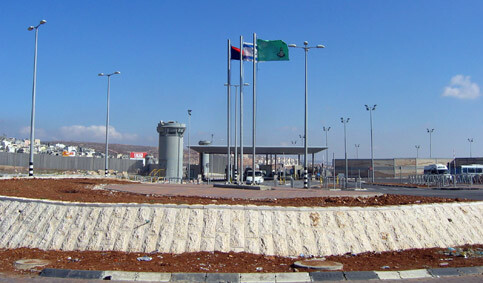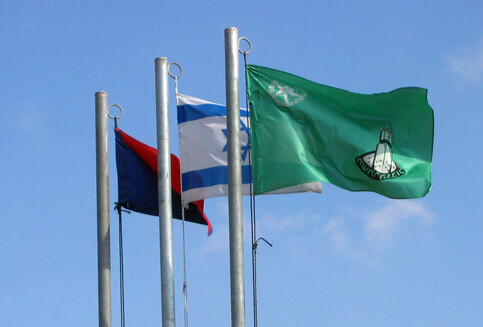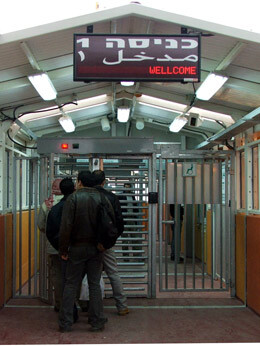The Electronic Intifada 24 October 2006

A wide view of Qalandiya checkpoint, which used to also feature street vendors drawn to this de facto high-traffic site (Rima Merriman)
While the Qalandia checkpoint was still under construction some months ago, before the Israelis had turned it into a border that demarcated their de facto annexation of East Jerusalem and its environs, it had remained for a while a busy, bustling intersection, in accordance with its very nature. The Israelis have plunked their border on the direct route that linked Nablus and Ramallah with Jerusalem and Bethlehem.
Until the system of revolving steel turnstile doors and holding chambers were finished, Palestinians had been in a kind of denial and incredulity about what was happening and simply went about their business, crossing as long as they were allowed to cross. Even a few days ago on the first day of the holiday Eid al Fiter, a mother with children in tow, all in their Eid best, gave the border a try against all odds, hesitantly showing her West Bank ID to the Israeli police squinting behind his bullet-proof glass window, only to be promptly turned back. That she should even be trying at this point is in itself incredible. In her mind, the reality of this pop-up border is so unfair, so grossly callous, it is simply hard to accept. Or perhaps, she thought, innocently, that the Israeli border police would let her in just this once. After all, it was Eid al Fiter, wasn’t it? This is how little she understood the political dynamic all around her.
The only Palestinians allowed to use this border are Jerusalem ID holders who are trapped in a few densely-packed suburbs of Jerusalem that Israel does not want in its plans, because it does not want the Palestinians residing there, no matter that they already have Jerusalem IDs. Theoretically, this border is also open to internationals, but you will be hard-pressed to see any, as Israel is issuing them visas to enter the occupied territories more and more infrequently. The border is open to “permit holders” (example, West Bank teachers in Palestinian schools in Jerusalem, who have permits that need to be continuously renewed). All the while, of course, Israeli settlers zip merrily through in their cars commuting easily and smoothly back and forth between Israel and their ill-gained settlements in the West Bank and in East Jerusalem, growing fat on their tax benefits and other incentives.

Israel’s national, army, and boder police flags loom over Qalandiya checkpoint (Rima Merriman)
The erstwhile makeshift circle at Qalandia that the Israelis had thrown together with huge blocks of concrete when they first started constructing their border monstrosity is now a manicured circle on the Israeli side of the Israeli-imposed border. Gone are the Palestinian vendors and cab drivers that congregate wherever there is traffic and a chance to make a living, having been tolerated just while the Israelis were digging. Along with the Israeli flag billowing from the poles planted on the circle are two others, a green flag that displays something resembling a prison tower (the flag of the Israeli border army) and a red and blue flag designating a combination of Israeli police forces. There is even a red sign with the Arabic word for welcome (ahlan) against the wall which balances the “Have a Nice Stay” on the other end.
Among other bizarre features of this border is not that the Israelis are in control of both ends of it, but they carefully observe the niceties of any border crossing. This illegal border station is now officially named after an illegal Israeli settlement, not after the Palestinian refugee camp (Qalandia) that slouches right up to it (The main Ramallah-Jerusalem road, now closed by virtue of this border station, goes right through the camp). In spite of their proximity to the new-fangled border crossing, the residents of Qalandia camp (registered refugee population 10,024) are not allowed to experience a “nice stay” in their ancestral villages down the road.
The muck and muddle of Palestinian traffic, congestion and poverty have been moved out of sight of this civilized bastion, where the “no littering” signs are next to arrows that lead Palestinians, strangers in their own land, to neatly uniform buses bound to East Jerusalem and nowhere else. West Bankers must take roundabout, rutted and winding roads from one Palestinian spot to another. In this Israeli-constructed world that defies Euclidian geometry, the longest distance between two points is a straight line. Palestinians cannot go through or into what Israel has stolen in broad daylight - East Jerusalem. They are not allowed to do that even during Eid al Fiter, when Moslems are exhorted by Islam to make every effort to connect with their blood relatives, a duty Moslems call “the connection of the womb”.

Inside the Qalandiya checkpoint terminal, LCD signs give the military checkpoint the superficial niceties of a border crossing (Maureen Clare Murphy)
But these simple truths are not what you ever hear from Bush or Rice. No doubt, these two are endorsing other borders and other sectioning offs as Israel dreams them up. The Palestinians will likely be presented with these solutions just as soon as “negotiations” get back on track - as they were at Camp David, for example.
What Bush and Rice understand, what they are obsessed with these days is terrorism, especially that associated with Islam. How Israel’s annexation and total control over East Jerusalem and the Al Aqsa Mosque is going to help the world with that sad phenomenon is hard to figure out.
While Israel is mobilizing hundreds of churches globally to pray for “God’s solutions for the city of Jerusalem” (three guesses what those are), Moslems, from Lebanon to Iran to Indonesia, demonstrate every year during the last week of Ramadan on Jerusalem Day in order to remind the world of the importance of Jerusalem to Moslems. It doesn’t help that Palestinians are being turned away from prayer at the Mosque by Israeli sound and tear bombs while others resort literally to scaling walls at pain of being shot dead in order to get through.
Rima Merriman is a Palestinian-American living in Ramallah in the occupied West Bank.





